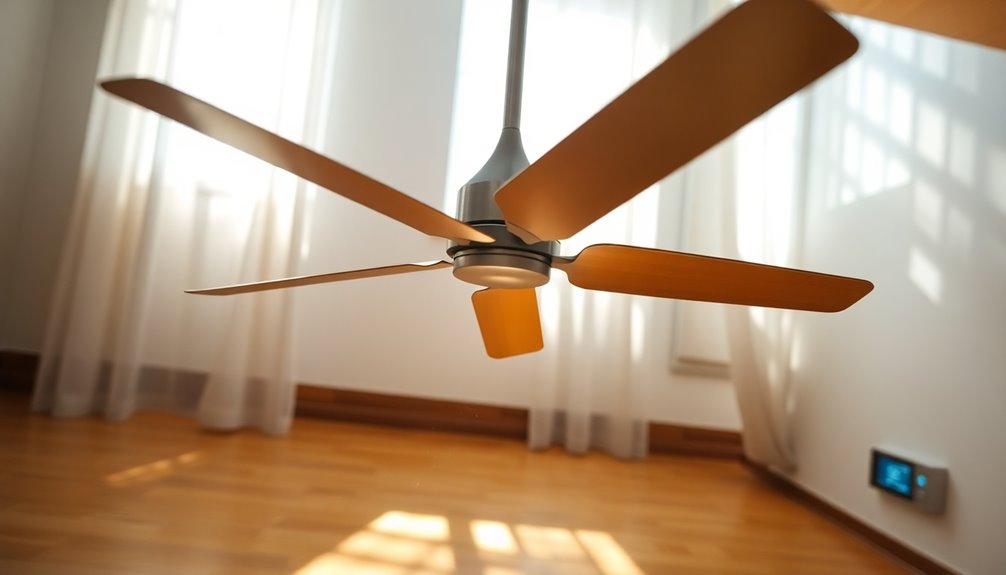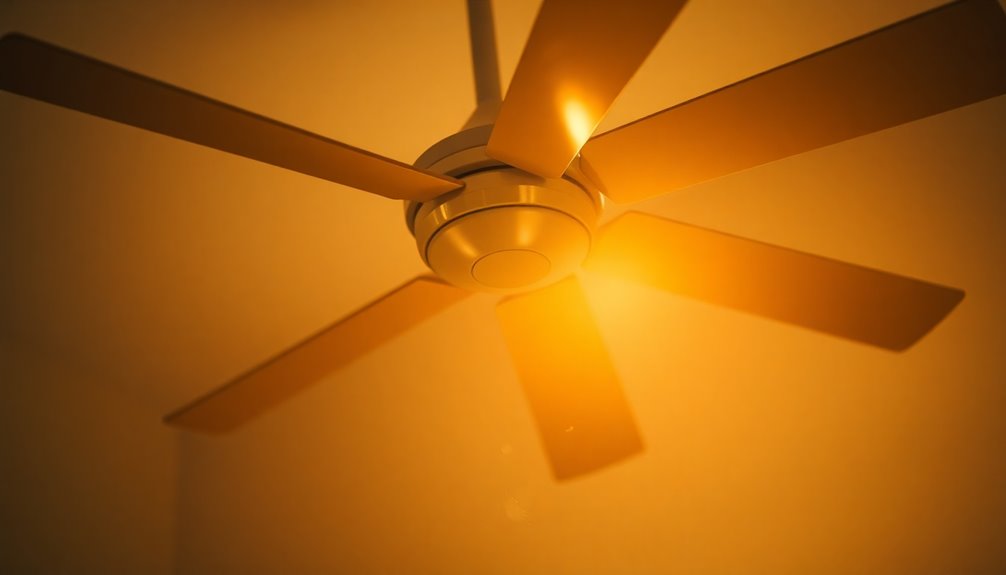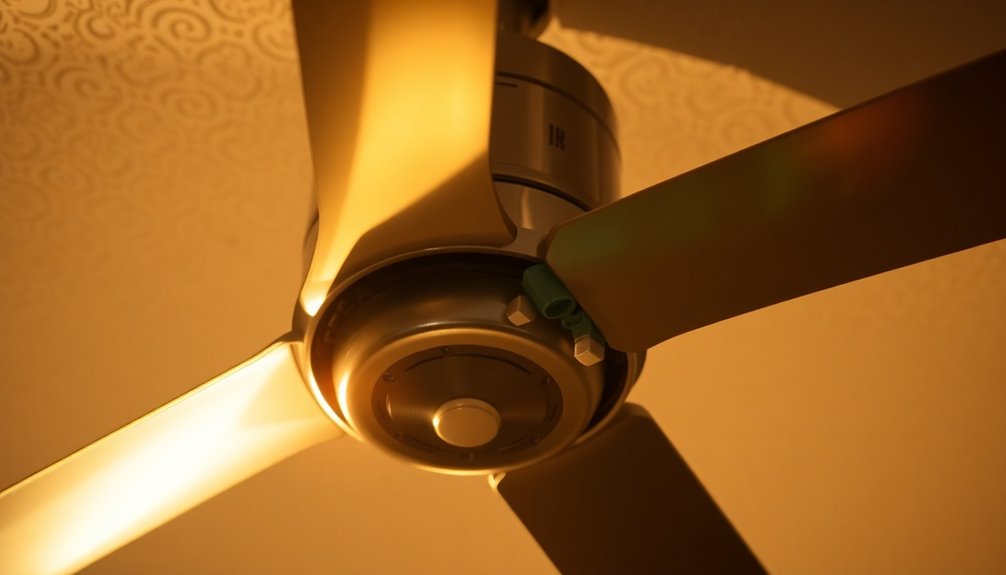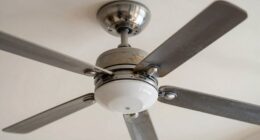A squeaky ceiling fan isn't just annoying; it can actually be dangerous. That noise often signals underlying issues, like friction in the motor or bearings, which can lead to overheating or even electrical shocks if ignored. Dust buildup and insufficient lubrication worsen the problem, increasing fire risks and potentially causing severe damage. You should address those sounds promptly to prevent accidents. Regular maintenance, such as cleaning and lubricating, is essential to keep your fan functioning safely. Want to know how you can guarantee your fan runs quietly and efficiently? There's more to explore on keeping your fan in top shape.
Key Takeaways
- Squeaky ceiling fans can indicate friction in the motor or bearings, potentially leading to overheating and fire risks if ignored.
- Prolonged neglect of squeaking may cause permanent damage to the fan's motor or bearings, increasing the likelihood of failure.
- Faulty wiring or connections can result in electrical shock hazards, making it essential to address any unusual noises promptly.
- Accompanying wobbling or vibrations may signal loose components, which can lead to fan blades detaching and pose safety hazards.
- Regular maintenance and inspections help prevent squeaking and ensure safe, efficient operation of ceiling fans.
Understanding Squeaky Ceiling Fans

A squeaky ceiling fan often signals underlying issues that you shouldn't ignore. This noise usually stems from friction within the motor or bearings, indicating that your fan may need immediate attention. If you let it go unchecked, you risk increased wear and potential failure, which can lead to more severe problems down the line.
Regular maintenance is essential for keeping your ceiling fan in peak condition. Dust accumulation or a lack of lubrication can exacerbate friction and contribute to the annoying squeak. Additionally, loose components can cause wobbling, leading to further mechanical damage if not tightened promptly.
Failing to address these concerns can also lead to overheating, creating a dangerous situation where electrical problems or fire hazards might arise. By taking the time to inspect and maintain your ceiling fan, including proper lubrication of the bearings, you can prevent these issues and extend the lifespan of your fan.
In short, staying proactive with your fan's maintenance not only guarantees a quieter operation but also keeps your home safe from potential hazards.
Don't wait for the squeak to become a bigger problem—act now!
Common Causes of Squeaking

Squeaking noises from your ceiling fan often stem from dust buildup and the need for lubrication.
When dust accumulates, it can increase friction on the bearings, leading to those annoying sounds.
Regular cleaning and proper lubrication can help keep your fan running smoothly and quietly.
Dust Buildup Effects
Ceiling fans can become noisy when dust accumulates in their components, particularly in the bearings. This dust buildup increases friction, leading to squeaking noises that indicate your fan needs attention. If you neglect this issue, you may encounter additional problems like insufficient lubrication, which can exacerbate the squeaking.
Dust accumulation doesn't only affect the bearings; it can also settle on the blades, disrupting balance and airflow. This disruption can cause extra vibrations, amplifying the noise and reducing your fan's overall efficiency.
Regular maintenance is essential to avoid these issues. By performing routine cleaning, you can greatly decrease dust buildup, thereby minimizing squeaking noises and enhancing performance.
Ignoring the signs of dust buildup can result in wear and tear on your ceiling fan's components. Over time, this can lead to more severe repair issues, costing you more in the long run.
Keeping your ceiling fan clean and well-maintained is an easy way to guarantee a quiet and efficient operation. So, don't overlook those squeaks—attending to them promptly can save you from bigger headaches down the road.
Bearing Lubrication Needs
Many homeowners experience squeaking noises from their ceiling fans, often stemming from dirty or dry bearings. This squeaking usually indicates increased friction, which can lead to wear over time if you don't address it. Regular maintenance is essential for keeping your fan running smoothly.
Lubricating the bearings at least once a year is a simple yet effective way to prevent that annoying noise. Accumulation of dust and debris can exacerbate the noise, making it important to clean the bearings regularly.
When you clean and lubricate, you minimize friction, ensuring ideal performance and efficiency of your ceiling fan. Inspecting the bearings for signs of damage, like pitting or scoring, is also critical. Damaged bearings can worsen squeaking and may need professional replacement.
Using the right type of oil for lubrication can extend the life of your bearings and enhance the overall efficiency of your fan. By taking these proactive steps, you can reduce noise and maintain a comfortable environment in your home. Additionally, investing in best home security systems can further enhance your comfort by ensuring a safe living space.
Potential Risks of Ignoring Noises

Ignoring the noises that come from your ceiling fan can lead to serious consequences. A squeaky fan might seem harmless, but neglecting it can escalate into significant risks, including overheating and fire hazards. Prolonged inattention to mechanical issues can dramatically shorten your fan's lifespan, resulting in costly repairs or replacements.
| Potential Issues | Consequences | Prevention Tips |
|---|---|---|
| Overheating | Increased fire risks | Lubricate bearings regularly |
| Mechanical Issues | Permanent motor or bearing damage | Address squeaks promptly |
| Electrical Problems | Risk of electrical shock or fire | Check wiring and connections |
Failure to address that annoying squeak can mask more severe problems, like faulty wiring. Additionally, an inefficient fan strains its components, leading to higher energy bills over time. By ignoring these noises, you're not just risking your fan's performance—you're also putting your safety and wallet at stake. So, don't wait for the situation to worsen; take action to guarantee your ceiling fan operates smoothly and safely.
Identifying Serious Issues

When you hear a squeaky noise coming from your fan, it's vital to take notice, as it often points to underlying issues that could escalate into serious problems.
A squeaky ceiling fan might indicate dirty or damaged bearings, leading to increased friction and potential overheating if you don't address it promptly. If you notice the squeaking is accompanied by wobbling or excessive vibrations, this may signal loose components or unbalanced blades, which can result in mechanical failure over time.
Ignoring these sounds could escalate into more severe issues, such as the fan blades detaching during operation, creating significant safety hazards.
Additionally, the squeaking noise could stem from electrical issues, like faulty connections or a malfunctioning motor, which pose fire risks if left unresolved.
To avoid these dangers, regular maintenance is essential, including lubrication and inspection of moving parts.
By staying proactive about your fan's health, you can prevent minor squeaks from turning into serious concerns that jeopardize your safety and well-being.
Don't wait for the problems to worsen; take action when you notice those warning signs.
Maintenance for Squeaky Fans

To keep your ceiling fan running smoothly and quietly, regular cleaning is essential. You should also stick to a lubrication schedule to prevent parts from drying out and causing squeaks. Additionally, using lightweight oils can help ensure the fan operates without noise. Finally, don't forget to inspect your fan for any signs of damage, as addressing issues early can save you from bigger problems down the line.
Regular Cleaning Practices
Regular cleaning practices are essential for maintaining a quiet and efficient ceiling fan. Dust and debris can accumulate on the blades and motor, causing friction that leads to annoying squeaking noises. To prevent this, you should clean your ceiling fan at least once a month.
Use a soft cloth or a vacuum with a brush attachment to wipe down the blades and housing. This regular cleaning helps maintain peak performance and reduces noise.
Don't forget to inspect the motor and bearings too. Use compressed air or a damp cloth to verify they're free of accumulated dust. Over time, dirt can exacerbate squeaking sounds, making routine cleaning even more critical.
Additionally, check the fan's light fixtures regularly. Loose connections or dust can cause rattling or squeaking noises.
Lubrication Schedule Importance
A well-lubricated ceiling fan runs smoothly, reducing the chances of annoying squeaks and extending its lifespan. To keep your fan in prime condition, you should establish a regular lubrication schedule, ideally performing maintenance at least once a year. This routine not only minimizes friction on the fan bearings but also considerably cuts down on operational noise.
Using the right lubricant specifically designed for fan bearings is essential; it can help reduce mechanical wear and extend the motor's life. When you neglect lubrication, increased friction can cause overheating, leading to potential fan failure and safety hazards.
By observing a consistent lubrication schedule, you maintain quiet operation and enhance overall fan efficiency.
Additionally, it's smart to pair your lubrication practices with routine inspections. This way, you can catch any early signs of wear or damage, ensuring timely maintenance that minimizes operational issues.
Inspecting for Damage
When dealing with a squeaky ceiling fan, inspecting for damage is crucial to maintaining its performance and safety. Start by listening for squeaking noises that might indicate underlying issues. Carefully inspect for loose screws and fasteners in the fan assembly. Loose parts can contribute to noise and may lead to structural problems over time.
Next, check the fan's bearings for signs of damage, such as pitting or scoring. Damaged bearings increase friction, causing louder squeaks and potential overheating. Confirm the fan blades are balanced and free from warping; unbalanced blades can create vibrations that lead to more mechanical stress on the components.
Don't forget to clean dust and debris from the motor and bearings, as this can help reduce friction and prolong the fan's lifespan.
If you notice persistent squeaking noises even after your inspection and maintenance, it's wise to consult a professional electrician. They can evaluate more serious issues, like motor misalignment or significant bearing damage, confirming your fan operates smoothly and safely.
Regular inspections can save you from costly repairs down the line.
When to Seek Professional Help

Sometimes, a squeaky ceiling fan isn't just a minor annoyance; it can signal underlying problems that need professional attention. If you've already tried cleaning and lubricating the bearings but the squeaking persists, it's time to evaluate a professional assessment.
Continuous noise could indicate deeper mechanical issues, such as misalignment or wear, that could escalate into severe damage or safety hazards.
If your fan starts to emit unusual noises alongside flickering lights or electrical malfunctions, consult a licensed electrician immediately. Ignoring these signs could lead to potential fire risks.
Additionally, if the noise is accompanied by a noticeable performance decrease, this may suggest failing components that require replacement.
Regular maintenance checks performed by professionals can help catch these issues early, ensuring your ceiling fan operates safely and efficiently.
Don't hesitate to seek help if you suspect damaged parts or ongoing mechanical problems. Taking prompt action can save you from more significant repairs down the line and enhance your home's safety.
Safety Tips for Ceiling Fans

To keep your ceiling fan safe and functional, regular maintenance is key.
If you notice any new noises, don't ignore them; addressing these issues promptly can prevent bigger problems down the line.
Regular Maintenance Importance
Regularly maintaining your ceiling fan is essential to guaranteeing its safety and efficiency. By committing to regular maintenance, you can considerably reduce the risk of squeaking noises, which might indicate underlying mechanical issues.
Start by inspecting and tightening any loose parts, especially screws and components, to guarantee smooth operation and minimize noise during operation. Additionally, being aware of common issues can help you better understand potential problems with your ceiling fan. Regular maintenance, such as cleaning filters, can also improve overall performance.
Don't overlook the importance of cleaning and lubrication as well. Annual lubrication of motor bearings is vital; dry bearings lead to increased friction and can exacerbate noise, potentially shortening your fan's lifespan. Keeping the fan clean also prevents dust accumulation, which can affect its efficiency.
Regularly checking for signs of wear on blades and motors can help you identify issues early, preventing costly ceiling fan repairs down the line. Understanding the significance of proper maintenance is crucial for prolonging the life of your fan.
Proper installation and alignment of your ceiling fan enhance not just performance but also reduce vibrations and noise, contributing to a safer home environment. Additionally, modern Energy Star certified fans can help you save on energy bills while maintaining a comfortable living space.
By staying proactive with these maintenance tasks, you not only enhance your fan's efficiency but also protect your home from potential hazards. Regular inspections can help ensure that your fan operates safely and effectively for years to come.
Immediate Noise Response
When a squeaky ceiling fan raises its voice, it's vital to take immediate action to guarantee safety. First, you should turn off the fan right away. That annoying noise could indicate that the motor bearings are dry or damaged, which might lead to overheating and potential electrical hazards. The last thing you want is for a malfunctioning fan to cause a fire or other serious issues.
Next, consider performing some basic maintenance. Lubricating the motor bearings may resolve the squeaking and help your ceiling fan run smoothly.
However, if the noise persists after this simple upkeep, it's time to seek professional intervention. Ignoring those sounds can exacerbate mechanical problems, leading to costly repairs or even the risk of the fan falling if it's not securely mounted.
Advantages of Regular Inspections

Over time, regular inspections of your ceiling fan can uncover potential issues that might otherwise go unnoticed. These checks are essential for identifying wear and tear on bearings, which can lead to increased noise and mechanical failure if left unchecked.
By conducting routine inspections, you can catch loose screws or components early, preventing rattling and greatly prolonging your fan's operational lifespan.
Additionally, regular inspections help guarantee your ceiling fan operates efficiently. They reveal dirt and debris buildup on blades and motor components that can affect performance and noise levels.
Cleaning these areas enhances airflow and reduces the chance of squeaking noises. Moreover, lubricating bearings during inspections minimizes friction, allowing your fan to run smoothly.
Don't overlook the importance of compliance with safety standards. Scheduling annual inspections can help you maintain safety and reduce the risk of fire hazards associated with faulty electrical components.
Preventing Future Noise Problems

Noise issues with ceiling fans can often be prevented through proactive maintenance and attention to detail.
One of the best ways to start preventing future noise problems is by regularly cleaning the fan blades and motor. Dust and debris can increase friction, leading to annoying ceiling fan noises. Make it a habit to lubricate the bearings at least once a year to guarantee smooth operation and minimize squeaking sounds.
It's vital to periodically inspect all screws and components for tightness. Loose screws can cause rattling and wobbling, which can escalate into larger noise issues.
Adjusting the blade pitch and balance is also important; maintaining even weight distribution helps prevent wobbling and noise over time.
Always follow the manufacturer's maintenance guidelines and perform routine checks to catch any signs of wear or damage before they become significant problems.
By taking these steps, you not only reduce potential noises but also extend the life of your ceiling fan.
Conclusion on Fan Safety

Maintaining your ceiling fan isn't just about keeping it quiet; it's also about ensuring it operates safely. A squeaky ceiling fan can signal underlying issues, such as dry or damaged bearings. If you ignore those squeaks, you might face more serious mechanical problems, leading to increased friction and potential overheating. This can compromise not only the fan's functionality but also your safety.
Regular maintenance is key to preventing these issues. Simple tasks like lubrication of bearings can keep your fan running smoothly and extend its lifespan, reducing the risk of failures that pose safety hazards. Additionally, regular maintenance is essential to prevent dangerous situations that can arise from neglecting fan upkeep.
If you notice that squeaking persists despite your maintenance efforts, it's time for a professional inspection. This can help identify any electrical or structural issues that could lead to dangerous situations.
In addition, ensuring proper installation and conducting regular checks can mitigate risks associated with a squeaky ceiling fan. By staying proactive about maintenance, you're not just keeping your fan quiet; you're also promoting safe and efficient operation in your home.
Always prioritize safety to enjoy the comfort of your ceiling fan worry-free.
Frequently Asked Questions
Should I Be Worried if My Ceiling Fan Is Squeaking?
If your ceiling fan's squeaking, you shouldn't ignore it. The noise often means the motor bearings need cleaning or lubrication.
If you address it promptly, you can prevent further damage. Regular maintenance helps keep your fan in good shape and extends its lifespan.
However, if the squeaking continues despite lubrication, it might indicate a more serious issue that requires professional help.
Stay proactive to avoid potential problems down the line!
Are Noisy Ceiling Fans Dangerous?
Noisy ceiling fans can signal underlying issues that might lead to danger. If you hear persistent squeaks, it's essential to investigate the cause, as it often points to dry or dirty bearings.
Ignoring these sounds can result in increased friction, overheating, or even complete fan failure. Regular maintenance, like lubricating moving parts, helps keep your fan running smoothly and safely.
Can a Noisy Ceiling Fan Fall Down?
Yes, a noisy ceiling fan can fall down if you don't address the underlying issues.
If you hear squeaking or wobbling, it likely means some components are loose. You should inspect the screws and mounting brackets regularly to prevent bigger problems.
If left unchecked, the wear on the hardware increases, making a fall more likely. Staying proactive with maintenance helps guarantee your fan remains secure and safe in your home.
Where to Spray a Squeaky Ceiling Fan?
You might be surprised to learn that fixing a squeaky ceiling fan is simpler than it seems.
To silence that annoying noise, spray lubricant specifically made for electrical appliances directly into the fan's bearings and motor housing. Just be careful not to hit the blades to avoid any mess.
After you apply it, use a soft cloth to wipe off any excess. Regular maintenance like this keeps your fan running smoothly and quietly.
Conclusion
So, while you might think a squeaky ceiling fan is just a harmless annoyance, it could be a sign of something more sinister lurking above. Ignoring those noises could lead to bigger problems down the line—who knew your ceiling fan could be a drama queen? Regular maintenance and inspections not only keep your fan quiet but also guarantee your safety. After all, you'd rather deal with a little squeak than a ceiling fan that decides to take a dive!









